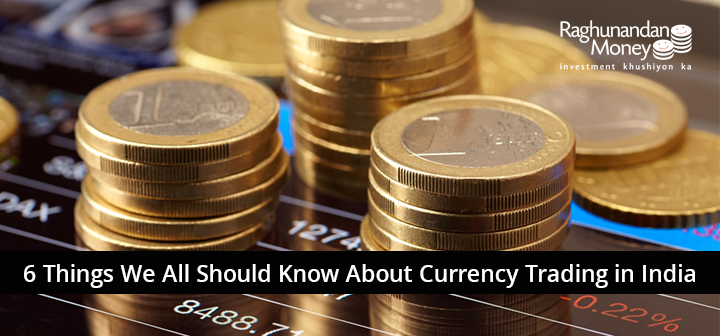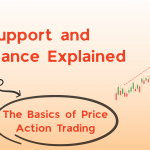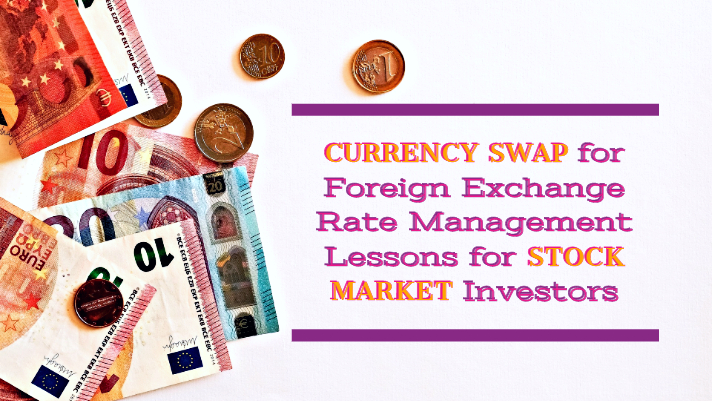Commodities and equities trading is something that has become common in India by now. But a high potential market which most of the traders and investors are unaware of is the currency market. Currency trading holds great potential of earning profits is the traders are able to spot the right opportunity and can use those opportunities for their benefit.
Here are 6 top things you should know about currency trading
What is the Currency Market?
The currency market is a market that involves participants from all across the world. The currency market facilitates the buying and selling of different currencies. The major participants of currency trading include commercial banks, the central bank (RBI), corporations, various investment management funds, hedge fund managers, forex brokers, and last but not the least investors and traders like you and me.
What is Currency Trading?
Currency trading, as the name suggests, is the buying and selling of international currencies. The banks and financial institutions are often involved in the act of currency trading. Individual investors can also indulge in currency trading as it is legitimate. The profit from currency trading is earned due to the variations in the exchange rate of the currencies.
What are Currency Futures?
Currency market derivatives comprise of currency futures. They are basically exchange-traded futures contracts. The price of the futures contract is set in a specific currency at which another currency can be bought or sold. It is bought or sold at a future pre-determined date just like in the case of futures contracts. They are also referred to as foreign exchange futures. Currency futures are considered to be financial derivatives as the value of the currency futures contracts is derived from the underlying currency exchange rate. Trading in currency futures calls for the initial margin requirement. If the margin falls below the initial margin requirement a margin call is made to the investor, which means, that the investor will be required to deposit the required amount of money to arrive at the maintenance margin.
What are the Currency Options?
Just like an options contract, a currency option is a contract that gives the buyer the right but not the obligation to buy or sell a certain currency at a specified exchange rate in the future. Hence, it gives the right to exercise the contract only if the investor finds the price favorable. This choice is not available in the case of currency futures where the investors have the option to exercise the right.
What are the risks involved in currency trading?
Trading in the currency market is not only risky but also complex at the same time. Some of the risks involved in currency trading in India are as follows:
Interest rate risk
Interest rates have an impact on the country’s currency. The difference in currency values can cause dramatic changes in forex prices. Hence, the interest rate plays a potential risk in currency trading.
Leverage risk
Currency trading is different from equity and commodity trading. It also requires a margin amount as a small investment from the investor. This benefit of leverage allows the traders to have access to a large number of trades. Even a minor fluctuation can result in levying an additional margin requirement to be maintained by the investor. Hence, market volatility paired with aggressive leverage can be highly risky when talking about currency trading.
Credit risk
The credit risk is related majorly with the banks and financial institutions and has an insignificant role to play in the case of individual traders. Credit risk is when a voluntary or an involuntary action from the counterparty results in the non-repayment of the outstanding currency position.
Counterparty risk
The counterparty is the investor’s asset provider. The risk caused due to defaults in the transactions by the dealers and the brokers are referred to as counterparty risk. An exchange house or a clearinghouse in case of currency trading does not guarantee spot and forward contracts.
The traders and investors must be well aware of these different risks related to forex-trading, before stepping into the market.
What things should one remember while trading in the currency market?
In order to be successful in currency trading, it is essential that the basics, goals, and risk management by the investor is right. There are certain things which currency traders should keep in mind when entering into currency trading.
- Be well aware of your trading style. Every trader has a unique trading style. The currency trading style of the trader is in line with his or her risk profile. Understand your risk and return profile well before you start trading in currencies.
- Be cautious while choosing your broker and the trading platform. In order to be successful in currency trading, it is essential you have a good broker. A good broker will provide you handholding support when talking about forex trading or currency trading in India. He also ensures that you are regularly updated on the live currency market news which further prevents you from suffering losses.
- Be careful about your entry and exit points before you start currency trading. None of the tradings, be it equity trading, commodity trading, or currency trading is a sure shot success guarantee plan. You should always be prepared of exiting the market when things are not favorable for you. Always have a good idea about the possible trade scenarios to suffer minimum losses.
Bottom Line
Though currency trading has started gaining popularity lately among traders and investors a set of relevant challenges makes it an equally competitive and risky as well. In order to be successful and make a profit from currency trading, it is essential for the trader to have thorough knowledge and understanding of the domestic as well as of global economies. Last but not the least, be cautious when choosing your broker for currency trading.
About Author

Stock Trading Now trade in ₹9 Per Order or ₹ 999 Per Month Plans.
Future & Options Access F&O contracts with advanced tools for hedging and speculation.
Currency Trading Trade in major currency pairs and manage forex exposure efficiently.
Commodity Trading Diversify Trading with MCX & NCDEX by Trading in Gold, Silver, Base Metals, Energy, and Agri Products.
Margin Trading Funding Boost your buying power with upto 5X, Buy now Pay Later
Algo Trading Back test, Paper Trade your logic & Automate your strategies with low-latency APIs.
Trading View Leverage Trading View charts and indicators integrated into your trading platform.
Advanced Options Trading Execute multi-leg option strategies with precision and insights.
Stock Lending & Borrowing Earn passive income by lending stocks securely through SLB.
Foreign Portfolio Investment Enable NRIs and FPIs to invest in Indian markets with ease and compliance.
IPO Invest in upcoming IPOs online with real-time tracking and instant allotment updates.
Direct Mutual Funds 0% Commissions by investing in more than +3500 Direct Mutual Fund Scheme.
Corporate FDRs Earn fixed returns with low-risk investments in high-rated corporate fixed deposits.
Stocks SIPs Build long-term wealth with systematic investment plans in top-performing stocks.
Bonds & NCDs Access secure, fixed-income investments through government and corporate bond offerings.
Depository Services Safely hold and manage your securities with seamless Demat and DP services with CDSL.
Journey Tracing our growth and milestones over time.
Mission & Vision Guided by purpose, driven by long-term vision.
Why RMoney Platform Smart, reliable platform for all investors' needs.
Management Experienced leadership driving strategic financial excellence.
Credentials Certified expertise with trusted industry recognition.
Press Release Latest company news, updates, and announcements.
Testimonials Real client stories sharing their success journeys.
7 Reasons to Invest Top benefits that make investing with us smart.
SEBI Registered Research Trusted insights backed by SEBI-compliant research.
Our Technology Advanced tools enabling efficient online trading.
Calculators Access a suite of smart tools to plan trades, margins, and returns effectively.
Margin Calculator Instantly check margin requirements for intraday and delivery trades.
MTF Calculator Calculate MTF funding cost upfront to ensure full transparency before placing a trade.
Brokerage Calculator Know your exact brokerage charges before placing any trade.
Market Place Explore curated investment products and trading tools in one convenient hub.
RMoney Gyan Enhance your market knowledge with expert blogs, videos, and tutorials.
Performance Tracker Track our research performance with full transparency using our performance tracker.
Feedback Share your suggestions or concerns to help us improve your experience.
Downloads Access important forms, software, and documents in one place.
Locate Us Find the nearest RMoney branch or service center quickly.
Escalation Matrix Resolve issues faster with our structured support escalation process.
Back Office Log in to view trade reports, ledger, and portfolio statements anytime.
Account Modification Update personal or bank details linked to your trading account.
Fund Transfer Transfer funds instantly online with quick limit updation to your trading account.
Bank Details View our registered bank account details for seamless transactions by NEFT, RTGS or IMPS.
How to Apply IPO Step-by-step guide to apply for IPOs using your trading account.
RMoney Quick Mobile App Trade on-the-go with our all-in-one mobile trading app.
RMoney Quick login Quickly access your trading account through the RMoney Quick web-based trading.
RMoney Rocket Web Version Experience powerful web-based trading with advanced tools for algo traders.
RMoney Rocket Mobile Version Trade anytime, anywhere with our feature-rich mobile trading platform.




















